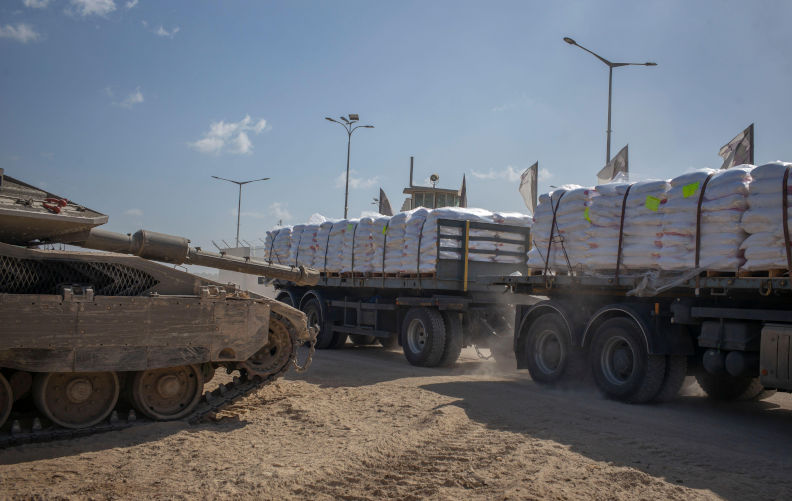UN warns 14,000 Gaza babies could die in 48 hours unless Israeli blockade lifted
May 22, 2025
Aid allowed into besieged area described as “a trickle among a sea of need”.
The United Nations estimated that the Netanyahu government’s continued starvation of more than two million Palestinians could kill up to 14,000 infants in the next two days without a serious influx of aid.
News outlets have reported since Monday [19 May] that Prime Minister Benjamin Netanyahu allowed five aid trucks carrying baby food and other nutritional aid into the besieged enclave – but humanitarian experts and workers have decried the arrival of the aid as “a trickle among a sea of need”.
Tom Fletcher, under-secretary-general for humanitarian affairs for the United Nations, said the tiny amount of aid was a “drop in the ocean” in a bombarded enclave where food security experts announced earlier this month that nearly a quarter of a million people are facing “extreme deprivation of food” and the entire population has “very high” levels of acute malnutrition and excess mortality.
While many medical workers have been killed in Israeli bombings, Fletcher told the BBC’s Radio 4 Today program that teams have assessed that 14,000 infants are likely to die within 48 hours if food aid can’t reach them. The small number of trucks allowed in through the Karem Abu Salem crossing on Monday — a fraction of the 600 per day that provided food, medications, water, and other aid to Palestinians during the recent ceasefire — have yet to actually reach civilians.
On Tuesday, 100 more UN trucks were given clearance to enter Gaza. Fletcher said humanitarian workers feared potential looting of aid trucks due to the chaotic, desperate situation faced by Palestinians.
The current blockade began on 2 March, and international humanitarian groups operating in Gaza have exhausted their reserves of food aid over the past 79 days.
“For over 70 days Israel has been starving the people of Gaza, depriving them of food, water, medicine, and essential supplies while escalating its cruel and indiscriminate bombing campaign,” said Wassem Mushtaha, Gaza response lead for Oxfam. “Two million people are on the brink of famine, and they are not just starving, but also traumatised, sick, and displaced from their homes.
“The limited entry of aid into Gaza cannot be mistaken for meaningful progress, especially alongside the expansion of Israel’s brutal bombing campaign across the Gaza Strip.
“It is not a turning point, but at best a narrow concession that seems to reflect mounting international pressure.”
The continued blockade on effectively all humanitarian aid prompted the United Kingdom, Canada, and France to issue a joint statement on Monday saying “the level of human suffering in Gaza is intolerable” and threatening “targeted sanctions”.
On Tuesday, UK Foreign Secretary David Lammy told Parliament that the government had suspended trade negotiations over Netanyahu’s blockade and plan to expand military operations across Gaza.
French Foreign Minister Jean-Noël Barrot said on Tuesday that his country also supported a review of the European Union’s trade relationship with Gaza.
“The blind violence and the blockade of humanitarian aid by the Israeli Government have turned the enclave into a death trap, not to say a cemetery,” Barrot said. “This must stop… It is an absolute violation of all the rules of international law.”
The European leaders’ comments were a departure from many Western governments’ insistence since 2023 that Israel is operating in self-defence and that it is targeting Hamas in retaliation for the group’s attack on 7 October 2023. Humanitarian groups, rights experts, and progressive lawmakers have called on Western governments to end their support for Israel, which faces a genocide case at the International Court of Justice.
Bushra Khalidi, Oxfam’s policy lead in the occupied Palestinian territory and Gaza, said on Tuesday that “what is urgently needed is for all crossings to be opened to allow a full and proper humanitarian response that allows real access, with safe corridors and respect for international humanitarian law”.
“A token convoy does not equal progress, only sustained, accountable access through every crossing will end the impunity that keeps aid from flowing,” said Khalidi. “We must also see an end to the relentless bombing and attacks on Palestinian people, with an urgent and permanent ceasefire, alongside justice and accountability for all.”
Republished from Common Dreams, 20 May 2025
The views expressed in this article may or may not reflect those of Pearls and Irritations.

